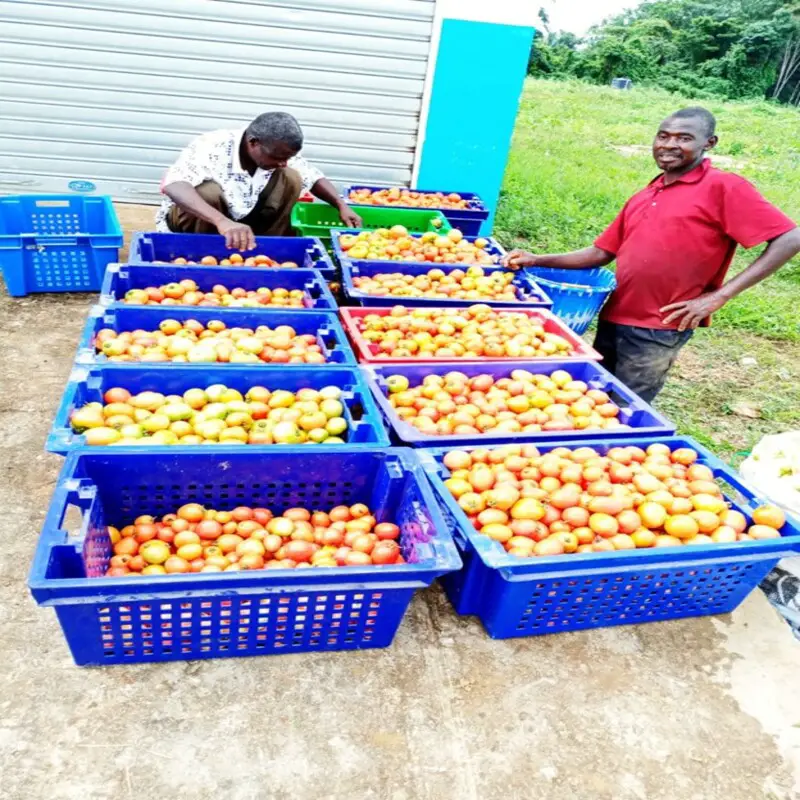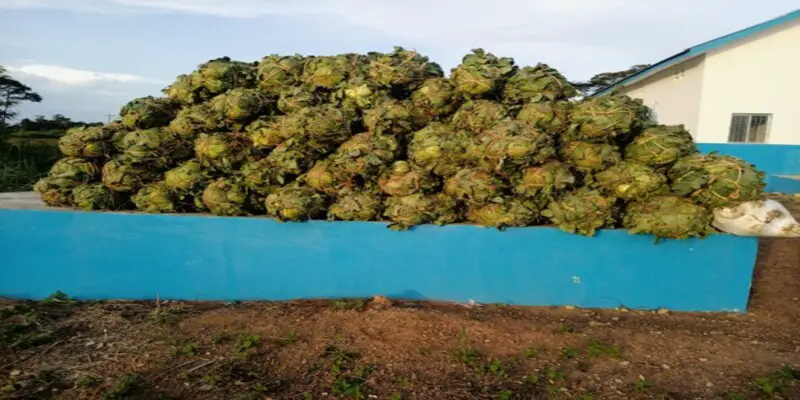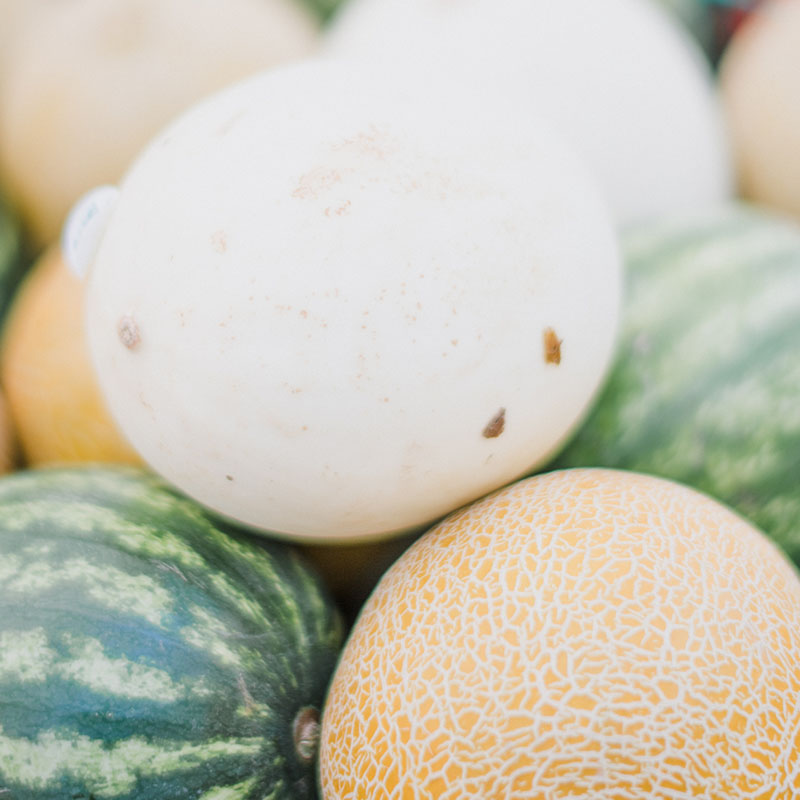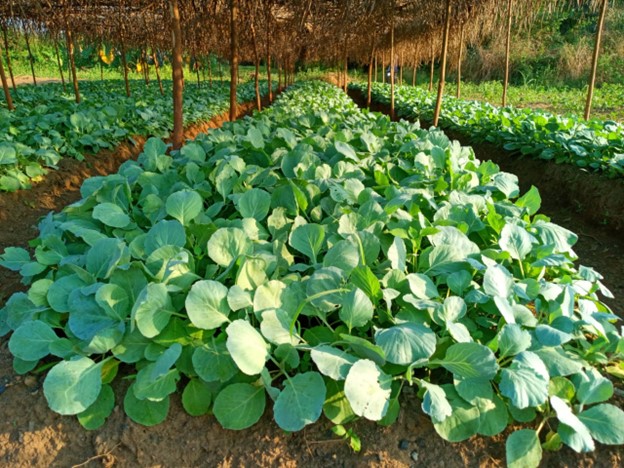Our Approaches to Farming
The innovative approaches to agricultural and economic development including Climate Change carried out by Say No-To-Hunger Multipurpose Cooperative Society are as follows:
Circular Agricultural Farming
This ranges from the production of oil palm from our Oil Palm Plantation that is processed into red palm oil. The kernel from the processed palm nuts is then cracked and processed into palm kernel oil that is used for soap making and other purposes; while the kernel cake is used as feed for our animals (currently over 400pigs/porks). Interestingly, we use the manures from the pigs as organic fertilizer for the production of our mixed vegetables and corn/maize productions in order to minimize the use of synthetic chemical-based fertilizer and remote livestock feedstock. By this, we keep the residuals of the agricultural biomass and food processing within the food systems as renewable resources.
Low external inputs agricultural and organic Farming
It is another innovative approach to agricultural and economic development used by our cooperative as they aim to increase farmers’ profit by using on-farm resources more efficiently.
Crop Rotation
Crop rotation is one of the most powerful techniques of sustainable agriculture used by us. This method helps tackle pest problems on our farms, as many pests prefer specific crops. The rotation will break the reproduction cycles of pests on our farm. During this process, we will plant other crops that will replenish plant nutrients in the soil. These crops will reduce the need for chemical fertilizers.
The transfer of agricultural and management knowledge
The transfer of agricultural and management knowledge as well as the introduction of new products (onion, tomato, lettuce, carrot, etc) all of which are produced through the use of non-chemical(i.e. cultural, mechanical, and biological) methods within the Integrated Pest Control (IPMC).
Projects Implemented by the Cooperative:
The United States African Development Foundation (USADF) Grant
On June 30, 2023, the Say No-To-Hunger Farmers’ Multipurpose Cooperative Society (SNoTHFaMCoS) signed a three-year grant agreement worth US$249,670.00 with the United States African Development Foundation (USADF). This grant, implemented by EDUCARE-Liberia, has led to several activities aimed at enhancing the cooperative’s operations.
Challenges Before the Grant:
Before the signing of the Memorandum of Understanding (MoU), SNoTHFaMCoS faced several challenges that hindered its growth into a more profitable and sustainable association. These challenges included:
- Limited access to funds to procure vegetables from farmers.
- Lack of proper storage facilities for perishable crops.
- Limited training opportunities for management and farmers.
Impact of the Grant:
With the introduction of the grant, the challenges mentioned above have been addressed. Additionally, the grant focuses on resolving other issues, including:
- Improving Financial and Managerial Capacity
- Enhancing the cooperative’s financial capability, administrative, and managerial capacity.
- Facilitating the distribution of inputs to farmers.
- Improving production and productivity to increase sales and incomes.
- Addressing Production and Storage Constraints
- Tackling constraints related to producing, storing, and preserving vegetables.
- Production and Post-Harvest Loss Activities
- Establishing a revolving fund to pay over 1,500 farmers/members upon delivery of their vegetables to the cooperative’s office.
- Setting up a nursery with 17,700 kilograms (kg) of assorted vegetables for its members.
- Providing access to credit for over 1,500 members through their Village Savings and Loan Associations (VSLA). Farmers will use their produce to pay for inputs during the planting season.
- Establishing and managing an input purchase fund for farmers, providing capital to procure inputs such as agrochemicals, fertilizers (urea, NPK), approved pesticides, and basic protective clothing (boots, masks, goggles).
- Training and Technical Assistance
- USADF Required Training
- SNoTHFaMCoS participates in USADF-required training on financial reporting and participatory monitoring procedures, delivered by USADF’s partner organization EDUCARE -Liberia.
- The cooperative arranges training for its staff, management, and farmers in the following areas:
- Vegetable nursery management
- Environmental and safety risks mitigation
- Good agricultural practices
- Farming as a business
- Hiring an Accountant
- The cooperative hires an accountant during the first quarter of grant implementation to set up accounting systems and train three trainees. After six months, SNoTHFaMCoS, the accountant, and the USADF technical partner will evaluate and select one trainee to be retained by the association. The retained trainee will work with the accountant for the remaining period of the project and will replace the accountant at the end of the project.
- Business Plan Development
- SNoTHFaMCoS hires a consultant to develop a three-year business plan to expand access to follow-on financing and support activities beyond the life of the project.
- Quality Control Expert
- The cooperative hires a quality control expert to ensure quality management and improve performance, and efficiency.
- Storage
- Cold Storage and Administrative Office Construction: SNoTHFaMCoS hires a construction supervisor to monitor the construction of a 6m by 10m cold storage platform and a 14m by 11m administrative office with a toilet. The storage room will house a cold storage container to preserve fresh vegetables, including watermelon, cucumber, carrot, okra, lettuce, pepper, parsley, cassava leaves, cabbage, and collard greens. This cold storage room will allow the association to store vegetables in large quantities and reduce post-harvest loss.
- Value Addition
- Cold Storage Container: The cooperative purchases a 20 ft fabricated cold storage container to preserve vegetable products and improve production, reducing post-harvest loss.
Cashless Grant
The Cooperative received a cashless grant from the FAO-Liberia’s office.
In 2018, the Cooperative received support from FAO through the “Promoting Increased Resilience and Sustainable Income Generation, Food Security and Nutrition for Rural Women” funded by UAE. This grant opportunity led to the construction of a warehouse, poultry construction, mixed vegetable production through the procurement of seeds, agro-chemicals, tools and equipment (power tiller, rice thrasher, PPE, etc), training, farmland clearing, irrigation, etc. This has brought tremendous changes to our cooperative.
Ministry of Agriculture/STAR-P/RETRAP-Emergency Response Rice Production
In mid-2023, The Ministry of Agriculture, Liberia, through its Smallholder Agriculture Transformation and Agribusiness Revitalization Project (STAR-P) and the Rural Economic Transformation Project (RETRAP), launched the mobilization of existing rice farms, and the establishment of new ones to boast rice production in the country. This led to the Emergency Rice Production Offensive(ERPO) aims to rapidly address the immediate rice production needs and increase local rice production by working with large-scale farmers, processors, cooperatives, and smallholder rice farmers in the counties: Bong, Lofa, and Nimba with a targeted land space of 10,000 hectares. Of the total amount of hectares expected to be cultivated within the three counties, Nimba is to cultivate 2,000 hectares.
On the 5th of June, 2023, Say No-To-Hunger Farmers’ Multipurpose Cooperative Society (SNoTHFaMCo) signed an MoU with the Ministry of Agriculture through STAR-P to coordinate and facilitate the production of 500ha of lowland rice in Sanniquellie Mahn District, Nimba County for 81 farmer groups with a total membership of 4,337. The total cost of the project is US$125,000.00. As part of its core functions among other things, the cooperative is tasked with the following responsibilities:
- Facilitate the development of work plans with specific milestones for the successful cultivation and production of lowland rice on the 500-ha
- Support farmers to carry on land clearing and land preparation, nursery establishment, and transplanting for the current cropping season
- Support farmers in carrying on weeding and harvesting of their crops
- Ensure implementation of the Emergency Rice Offensive Production activities towards achieving the targeted 500ha
- Conduct M&E and supervisory (Extension delivery services) visits to smallholder farmers to ensure timely achievement of milestones
- Prepare and submit progress reports to STAR-P and RETRAP Agronomist, Food Security Specialist, and Monitoring and Evaluation Unit based on reporting tools/templates and supporting documents to account for the funds, etc.
STAR-P/ MoA Grant
Say No-To-Hunger Farmers’ Multipurpose Cooperative Society is a proud beneficiary of the STAR-P/LACF grant. Over the past nine months implementing activities sponsored by the scheme, significant achievements have been made. Followings are key outcomes and impacts achieved through the production and aggregation of vegetables in Whelenla town, district number one, Nimba County.
- AREA UNDER CULTIVATION: At the project start, the cooperative produced assorted vegetables on average of 5ha with two production circles annually. Currently with the intervention of the project, the cooperative now produces 12ha with two production circles. This accounts for a 240% increase in the area of production.
- YIELD: Prior to project intervention, the average yield per hectare was 3.25 metric tons per hectare. Currently, with the project intervention, the cooperative experiences 4.36 metric tons per hectare which is an increase of 1.11 metric tons per hectare representing a 34.15% change
- SALES VOLUME: prior to project intervention, the annual sales volume was L$3,384,000.00. Just after nine months of project support, the sales volume has increased to L$7,961,800.00 representing a 135.28% increase.
- AGGREGATION: Before the STAR-P/ LACF grant intervention, the cooperative had no capacity to support non-cooperative Smallholder farmers by collecting their farm produce at the farm gate. They were left alone to struggle to find a market for their produce. Even the collection of produce from cooperative farms was a major challenge. Now with the support of the project, there is a dramatic change in marker access for cooperative and non-cooperative smallholder farmers. The cooperative’s capacity has been strengthened (through the provision of a six-ton JAC truck) to collect assorted vegetables at farm gates; thus serving as a major aggregator and market link for the smallholder farmers as well as the cooperative’s members.
- MARKET LINKAGES: To date, the cooperative through its aggregation initiative made possible through the project intervention serves as a guaranteed market link for 500 non-cooperative smallholder farmers within districts 1, 2, and 8 of Nimba County. Obviously, this service being provided by the cooperative has contributed to reduced transport costs, an increase in income generation, and the drudgery of farming experienced by the smallholder farmers.
- LIVELIHOOD IMPROVEMENT: Sincerely, the project intervention is making major impacts on the lives of the entire 218 membership of the cooperative comprising 135 ( 61.92%) females, 83 males (38.08%), and 207 (95%) youths. There is a case of 15 cooperative members expressing happiness for the ability to send their children to school and others are currently engaged in transforming their thatch houses to corrugated roofing.
- VSLA- A SELF-INITIARIVE: Because of the project’s intervention, the cooperative used part of its revenue generated from productive activities to initiate a VSLA to increase members’ access to finance. Already, 50 cooperative members (30 females, 20 males, and 38 youths) have benefited from the VSLA scheme. However, there is a concession for non-members to also benefit from the cooperative’s VSLA scheme. To date, a total of 15 non-cooperative members comprising 10 females and 5 males have benefited from the VSLA’s financial services.




